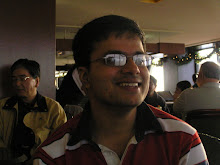“So what kind of books do you like?” Somebody asked me.
“Fantasies and science fiction”, out came the spontaneous answer.
This has happened several times. I just started to wonder why. I read all sorts of books and watch all genres of movies. But somehow it is this particular class that I enjoy the most. The reason, I think, is their imaginative power of creation.
Through my upbringing as a student of science and engineering or may be just as my natural instinct I am grown to see things as they are visible to the eye. Doing otherwise may often be termed as a lack of concentration. Think of a student who feels sorry for ‘x’ when he sees

, as poor ‘x’ has to carry ‘y’ around or goes ‘shhhhhh’ spotting ‘9’ cowering in the basement as ‘7’ hunts for him in

. Try that too often and you are standing on the bench the next moment or worse, kneeling down in front of the class. When I look at the table lamp in my living room right now, what I see is a funnel-shaped hood with a narrower circle on top joined to one below with bigger diameter by a whitish cloth tapered at a particular angle. A 60watt incandescent bulb glows inside adding approximately 0.6 cents per hour to my electricity bill. My brain is taxed to imagine that it is some sort of a oversized firefly that has a very bright head and at the moment is afraid and has hid its luminous body in its opaque whitish shell; if I am calm for some time and may be hum a soothing tune, it will first peep its head out and once confident of its safety, jump off the table to glide in the air flaunting its radiant wings. That sort of brain work doesn’t come naturally to me. That makes me wonder how people work with fantasy with such ease.
Fantasy stories were part of everyone’s childhood, mine being no exception. Indian stories with monsters and princes were captivating. The fact that the life of the monster was hidden in some other creature secretly locked somewhere was the best ingenuity I liked. (That just reminded me of the horcruxes; more on that later.) However, the one science fiction that I think really swept me away for the first time was the story of a robot and his kid master. I had an old wrist watch at home whose plastic cover on the dial could come off easily. I so wished that I could call my flying robot through that. I gave it a few tries too. Unfortunately, it didn’t work.
The next phase of my attachment to fantasies was dominated by Jules Verne. The journey started with the mysteries of
The Mysterious Island. Thereon, the great writer never ceased to dazzle me with all the adventures, the visions and the thrills.
Twenty Thousands Leagues under the Sea,
From the Earth to the Moon, and
Around the World in Eighty Days are to name just a few. The one that was closest to my heart though was
Adrift in the Pacific. It is the story of survival and dominance by a group of school boys in a deserted island. I could identify myself with a character called Briant in the story. It is still one of the most enjoyed stories I have ever read. Probably the only story that supercedes it is that of Shankar in
Chander Pahar. That is a gem by Bibhutibhusan Bandyopadhyay. I was lucky to follow up this superb story by another by the same author called
Hira Manik Jwale. Another story that I still remember was named
Chander Hasir Bandh Bhengeche. I read it in a puja edition of Anandamela. The author probably was Adrish Bardhan.
The most recent spate of fantasies will include the
Lord of the Rings by Tolkien, the Bartimaeus Trilogy by Jonathan Stroud, the exploits of Eragon in the stories by Christopher Paolini and of course the magic of Harry Potter by J.K. Rowling. What really astonishes me in all these stories is how the authors create a very different world with a different history and geography and society organized by a different set of rules meticulously put together to the last minute details. Tolkien and Paolini have created different races with their own habits, qualities and legends. They set their story in altogether different fantasy worlds with their own maps for guidance. Stroud and Rowling set the stories in our everyday world with an extra hidden layer of happenings. Stroud’s classification of supernatural creatures and the link between their and our world is a brilliant innovation. Rowling's creation though I think is by far the best. The Harry Potter series though generally termed as children literature has much drama, romance, politics, adventure and social messages to pass for any other genre. Coming back to fantasy, I am amazed how carefully Rowling has designed the magical world. It is so similar to our everyday life in terms of socio-political aspects, education, relationships, law and order but in every bit of it there is a magical twist. Read through her description of the ministry of magic or the hospital for magical remedies and you can immediately spot her brilliance. That attention to details is absolutely spellbounding. She painted a fine picture with words.
I lack that inspiration to extend my imagination beyond the mundane experiences. The science fiction and the fantasies probably satisfy the ineptitude of a realist.








